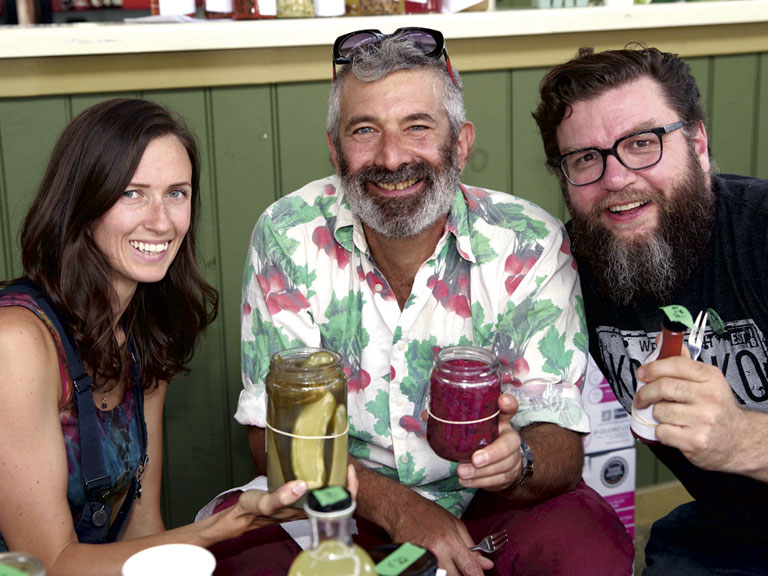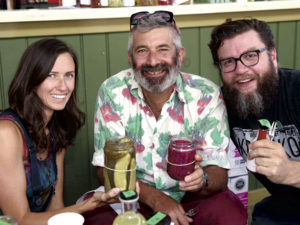County News
Fermentation revival

Festival brews up a recipe for success
Hundreds of people attended the third annual Ontario Fermentation Festival at the Crystal Palace in Picton on Saturday. In an event where the mascot is a kosher dill pickle, there was a definite air of whimsy and irreverence that accompanied the more serious pursuit of making tasty and healthful foods. Over 40 vendors had a range of fermented products on offer, from kombucha and kimchi to sourdough bread and cheese, with some beer and spirits thrown in for good measure. There was also an amateur fermented food contest that drew 115 entries, ranging from fermented sweet rice to a coffee and molasses kombucha. There were several tasting workshops for fermented foods, a series of mini demonstrations on how to make things like sauerkraut and ginger beer, and activities for kids that included pebble painting and a pickle piano—using dill pickles wired up to a computer circuit as the piano keys. Both adults and kids could try a session of cabbage yoga—a discipline that is likely unique to this festival—where the final savasana pose involves the eyes being covered with a cabbage leaf. Why? “It’s just for fun,” says Jessica Rogers of Creekside Yoga, who offered the session with her husband, Nathan. “And besides, we love kombucha and anything fermented.”

(L-R): Rebecca Lamb, Sandor Katz and Joel MacCharles show some of the entries in the amateur fermented food contest.
The festival was started in 2017 by Jenna Empey and Alex Currie of Pyramid Ferments. “We realized there was a growing market in this industry in Ontario and we really wanted to promote local food and local fermented food choices,” says Empey. “Fermentation used to be a community-based thing, but has fallen out of favour with the industrialization of the food system. People are realizing that fermentation is an important part of your digestion, and by not having it in your diet, people are suffering from different types of digestive disorders.” She says that the probiotic qualities of fermented foods promote a healthy microbiome in the gut and can actually help to boost the immune system. “‘You are what you eat’ is so much more important than people realize.” She says that some fermented foods are an acquired taste, but there are some that appeal to just about everyone. “A lot of them have umami, this deep flavour, and it’s really another sense that people don’t focus on. Kombucha is like fizzy lemonade, and who doesn’t like a dill pickle, really?”
A big part of the festival is the workshops and demonstrations. Keynote speaker Sandor Katz, who popularized the notion of fermented foods in North America with his 2003 book Wild Fermentation, gave a 20-minute workshop where he turned two heads of cabbage— obtained from the yoga demo—into a litre and a half of sauerkraut, just to show how straightforward the process is. “The products of fermentation have enjoyed enduring popularity around the world,” he says. “We’ve been eating them all along, but now people are more interested, and people are seeking out fermented foods, especially live-culture fermented foods that haven’t been cooked or heat-processed.” Katz says that factors of modern day life such as antibiotics, anti-bacterial chemicals and chlorinated water all contribute to diminishing the biodiversity in the gut, and that fermented foods offer a delicious way to restore the microbiome to a healthy state. “The lactic acid bacteria naturally present on vegetables produce acids that allow the vegetables to be preserved, and the bacteria are similar to those in our digestive system and they can help promote biodiversity in the gut.”
The workshops themselves drew plenty of attention. Some, such as the wine tasting session, were limited to 40 participants, while others were open to all. Cheryl Paswater gave a well-attended session on an old beverage that is coming back in style. Shrubs, as they are known, are a concoction of crushed fruit, vinegar and sugar that is allowed to sit for a few days, or up to a week, before being filtered and then ready to drink. “Shrubs are a great non-alcoholic option and it’s a great mixer too,” she says. “They were popular during Colonial times, and then disappeared around the Prohibition era, and now they are making their way back.” Paswater is based in Brooklyn, New York and has attended many fermentation festivals. This is her second visit to this one. “I love this festival,” she says. “Jenna and Alex and everybody who’s running this festival are fantastic. This is a great festival, whether you are already fermenting, or to be inspired to start fermenting, or maybe you walk away with a knowledge that microbes are cool.”

Comments (0)